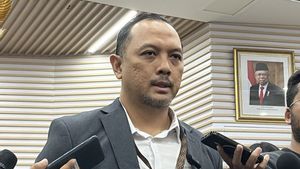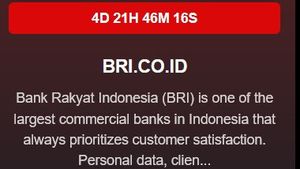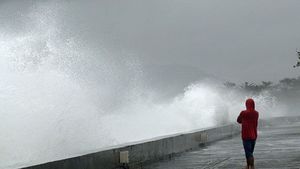JAKARTA - BRI held the "BRI Cares for Integrated Waste Processing Sites (TPST)" program. This is an initiative of the state-owned bank to help overcome the waste problem.
This program is integrated with other BRI programs. For example, the waste processing program in villages is part of the BRILiaN Village program.
One of them is implemented in Jatihurip Village, Cisayong District, Tasikmalaya, West Java.
Jatihurip Village is part of the 2020 BRILiaN Village in a village empowerment program that aims to produce role models in village development, through the implementation of superior village leadership practices with the spirit of collaboration to optimize the potential of SDG's-based villages.
Based on the Environment Agency (2019), the average waste produced by the Tasikmalaya community is 3.63 liters/person/day or 0.44 kg/person/day (DLH, 2017). As a result, now the waste of Tasikmalaya Regency reaches more than 291 thousand kg/day.
Judging from this data, the BRI Cares for TPST Program in Jatihurip Village needs to be done to reduce the volume of waste in Jatihurip Village, so that the volume of waste in Tasikmalaya Regency can be reduced.
Finally, in 2020, BRI responded and provided assistance in the form of a garbage dump or garbage bank. Thus, the garbage around Jatihurip Village can be accommodated and then sorted.
BRI Deputy President Director Catur Budi Harto said that the integration of the TJSL program carried out by BRI will not only have an impact on empowering the village economy, but also play a role in encouraging public awareness to maintain natural balance and environmental cleanliness through proper waste processing.
"In BRILiaN Village, the BRI Peduli TPST program will encourage public awareness about waste processing, so that it becomes an example and inspiration for surrounding villages," Catur said in a written statement, Saturday, April 1.
The BRI Cares for TPST Program consists of, waste training and institutional strengthening training, as well as waste bank business management in Jatihurip Village.
BRI also provided assistance in the form of an inorganic garbage crushing machine. "With this tool, the village has additional income, because the processed inorganic waste can be sold to collectors," said Catur.
Later, the income can be used for the operational interests of waste management, such as paying the garbage transport wage.
Meanwhile, Jatihurip Village Head Dadang Mursyid said, the beginning of the program was opened with the advantage of Jatihurip Village, one of which was fish breeding.
From there, BRI saw the potential to make the village an educational tour of fish cultivation.
The fish cultivation is supported by the large number of river flows, but the problem is that there is still a lot of garbage scattered because there are no waste disposal sites in the village. If the behavior of littering is continuously carried out, let alone into the river, it is certain that it will increasingly pollute water sources for fish cultivation.
"This garbage problem is a big problem for our society. We think we have to solve this waste problem so I communicate it to BRI, and they respond to how to deal with this waste," he said.
With the integrated waste management training program from BRI, now the level of public awareness in the area has increased.
The English, Chinese, Japanese, Arabic, and French versions are automatically generated by the AI. So there may still be inaccuracies in translating, please always see Indonesian as our main language. (system supported by DigitalSiber.id)












